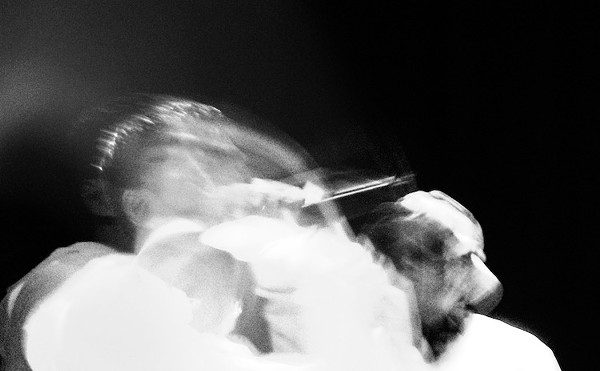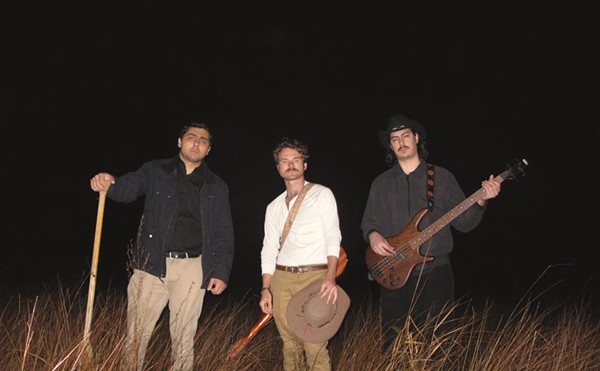Michael Jackson has tried to stop you from hearing John Oswald's music. So have the Doors. In 1989, the Canadian Recording Industry Association even filed legal action against the Toronto-based composer, demanding that he destroy the master tapes and all remaining copies of one of his recordings. But that same recording, a CD titled "Plunderphonic," made Oswald a household name, at least in some of North America's more esoteric households, and convinced the Grateful Dead, Elektra Records and others to commission him to do exactly what had got him in trouble in the first place.
Jackson and the other disgruntled artists and music-industry sorts who have taken offense did so because Oswald's music is their music -- folded, spindled and mutilated. For more than 30 years, he has been taking easily recognizable recordings by everyone from the Beatles to Bix Biederbecke to Beethoven to Edie Brickell and twisting them around -- first through analog tape editing and turntable manipulation, later through sampling, MIDI and computer technology -- into new, often revelatory, but still recognizable pieces that comment on or outright subvert their sources. We're not talking about isolated samples here -- Oswald has tended to use entire original performances, appropriated without prior permission, which is what has caused all the stir.
"69 Plunderphonics 96," Oswald's new two-CD set, sums up a career-to-date that anticipated the kind of cut-up, sample-centric, remix-ready mutability contemporary musicians and fans take for granted. Taken as a whole, his music also raises important issues regarding what well-known recordings mean once they've been twisted out of their familiar shape, the nature of copyright in the postmodern age, and how copyright laws have restricted certain types of creativity. Yet even while this landmark set makes a definitive case for Oswald's importance as an artist and provocateur, his work teeters on the verge of further controversy.
Listening to "69 Plunderphonics 96" is like spending a couple of hours in an aural hall of mirrors: Almost everything is familiar, but nothing appears in familiar form. Oswald's mutated "electroquotations" of everyone from Elvis Presley to Public Enemy bob by in a dense stream of music and ideas. What he would come to call "plunderphonic composition" derived from a youth spent listening to records on the "wrong" speed or backward and fiddling around with crude tape editing. The new set features his earliest surviving experiments, the "Barelys," a series of tape-spliced Chuck Berry numbers reduced to their distinctive intros and outros. Another early track, 1975's "Power," finds Oswald laying cut-ups of a leather-lunged radio preacher over a funky track (in this case, excerpts from Led Zeppelin's "The Wanton Song") six years before David Byrne and Brian Eno won accolades for doing the same on their album "My Life in the Bush of Ghosts." Oswald effected these transformations through an often intense process of listening and crafting that he estimates used to take a month's work, on average, to generate a minute's worth of tape.
At the heart of "69 Plunderphonics 96" and of Oswald's oeuvre is the original "Plunderphonic" album, 21 of the 22 tracks from which appear on the set. Even spread out across the two discs (divided nonchronologically into a CD of "Songs" and an instrumental CD of "Tunes") the pieces serve as a sort of Rosetta Stone of conceptual remixology. By varying the playback speed of a Dolly Parton recording of the old doo-wop hit "The Great Pretender" for his piece "Pretender," Oswald creates what he has called "an aural sex change." Parton's voice starts out as her usual Tennessee trill; as the recording slows, her voice deepens until she sounds like a depressive male tenor fighting to get out of that big-breasted body. A woozy vari-speed rendition of Bing Crosby's "White Christmas" ("White") makes Der Bingle sound more like the drunk he was in real life. Oswald reduces Metallica's "And Justice For All ... " album to an 88-second sputter of riffs and drums for "Net" and utterly dices Count Basie's rendition of "Corner Pocket" without mangling the Count's swing ("Pocket"). "Black" and "Brown" sample the sampled-to-death James Brown to within an inch of his life, while "Dab" chops up the sighs, grunts and plastic beats of Michael Jackson's "Bad" into something truly fearsome.
Each copy of "Plunderphonic," released on Halloween 1989, was stamped not for sale and given away to DJs, libraries, journalists, the artists whose work Oswald appropriated and anyone else who knew to ask. By not charging for the disc, Oswald assumed he was protected from any copyright violations. The Canadian Recording Industry Association thought differently. (The disc's cover art, which depicted Jackson's head superimposed on a naked white woman, probably didn't help matters.) By February 1990, Oswald was forced to deliver all remaining copies and the master tapes to the CRIA to be crushed. Even though a mere 700 already-distributed copies of the disc escaped destruction, the word was out.
"69 Plunderphonics 96" includes numerous pieces Oswald did for hire in the wake of the Plunderphonic flap. In 1990, Elektra Records commissioned the composer to work his magic on anything from its back catalog to celebrate the label's 40th anniversary. The suite of five pieces that Elektra declined to release officially at the time, thanks to a last-minute veto from the estate of Jim Morrison, graces the anthology's "Songs" disc. The "Tunes" disc features a short excerpt from "Grayfolded," an epic Oswald cut-up of various versions of the Grateful Dead's "Dark Star," sponsored by the band itself. The Kronos Quartet also tapped Oswald for compositions; the new set offers "Mach" (a duel between the string quartet and samples from the group that seems to be Oswald's favorite heavy-metal whipping boy, Metallica) and the Beethoven-biting "dWig." The 62-cut collection encompasses a treasure trove of more rare odds and ends that will dazzle even diligent Oswald followers.
Ironically, "69 Plunderphonics 96" arrives in the hands of consumers thanks to the theft of Oswald's own work. He originally intended to release the set several months ago on his own Fony Records imprint. To put out the collection in its unadulterated form, Oswald had to negotiate more than 100 licensing agreements and consent to pay fees, which raised the suggested retail price of the lavishly packaged, liner-note-crammed two-CD set to a whopping $100. At the last minute, a few key deals fell through, leaving the project in danger of never coming out. Enter Negativland. The West Coast-based conceptual sonic-art group (itself the survivor of numerous copyright battles, "appropriated" the Plunderphonics master tapes and artwork, and released the set on its own Seeland label for $33.33. The folks behind Negativland/Seeland were unavailable for comment, having taken steps to insulate themselves against hassles, since the new consumer-friendly cost guarantees that none of the license fees will be paid. (The group has posted a statement on Oswald's behalf.
Even if the music industry and its lawyers land on Seeland with both wing-tipped feet, the "69 Plunderphonics 96" set promises to get copies of Oswald's work into the hands and ears of more listeners than ever. And listening to the history of 20th-century music -- the entire history of recorded music, effectively -- turned on its head with such daring, such invention, such intellect and such rampant wit is an experience no adventurous music listener should miss.
To order "69 Plunderphonics 96" via mail order, send a check or money order for $33.33 to Seeland Records, P.O. Box 7218, Olympia, WA 98507-7218. For more information on John Oswald, visit his website.
















